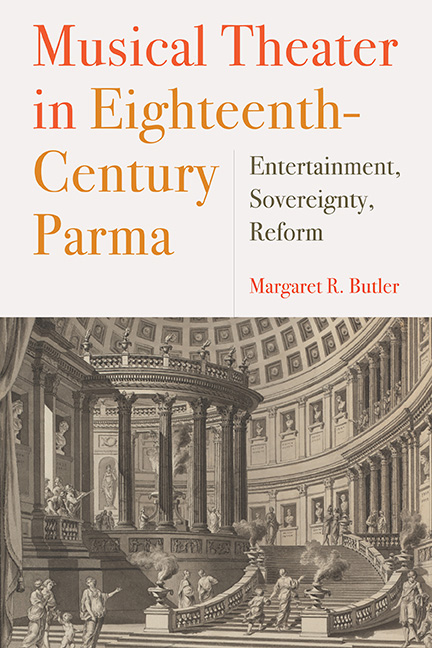Book contents
- Frontmatter
- Dedication
- Contents
- List of Illustrations
- Acknowledgments
- List of Abbreviations
- Notes to the Reader
- Introduction: The Genre Problem: Reform as Continuum and Brand
- 1 The Genesis of Parma's Projet
- 2 Behind the Scenes: Production and Management at the Teatro Ducale
- 3 The French Entertainments: Creation, Publicity, Propaganda
- 4 Moving On While Looking Back: Traetta's First Parma Operas
- 5 The End of the End of Reform: The Wedding, the French Ambassador's Opera, Traetta's Departure
- Conclusion: Reform Revisited
- Appendix: General Chronology
- Notes
- Bibliography
- Index
Introduction: The Genre Problem: Reform as Continuum and Brand
Published online by Cambridge University Press: 24 October 2019
- Frontmatter
- Dedication
- Contents
- List of Illustrations
- Acknowledgments
- List of Abbreviations
- Notes to the Reader
- Introduction: The Genre Problem: Reform as Continuum and Brand
- 1 The Genesis of Parma's Projet
- 2 Behind the Scenes: Production and Management at the Teatro Ducale
- 3 The French Entertainments: Creation, Publicity, Propaganda
- 4 Moving On While Looking Back: Traetta's First Parma Operas
- 5 The End of the End of Reform: The Wedding, the French Ambassador's Opera, Traetta's Departure
- Conclusion: Reform Revisited
- Appendix: General Chronology
- Notes
- Bibliography
- Index
Summary
“Le projet de nos opéras sur un nouveau plan est abandonné.”
[The plan for our operas on a new format has been abandoned.]
—Guillaume Du Tillot to Francesco Algarotti, 1762In 1985, Thomas Bauman described North German opera in the eighteenth century, writing: “We often judge as trivial that for which we have not yet found a context.” Over the ensuing thirty some years, scholars of eighteenth-century music have explored myriad contexts for many newly examined repertories. It is all the more surprising, therefore, that for certain musical genres we still lack detailed knowledge of a rich and nuanced context that might change our view of their development, the reason for their generic designations, how audiences understood, enjoyed, and used them, and how they fit into a broader picture: basic considerations that still have the potential to exert a strong influence on our understanding of music and culture.
Eighteenth-century reform opera is one of these genres. The genre itself is a complex problem consisting of many parts. Perhaps the thorniest part is that its label is anachronistic: it signifies a category that did not exist in the eighteenth century, but that is nevertheless understood as one in modern scholarship. Another part is that despite widespread calls for change in opera during the mid-eighteenth century, no “reform movement” actually existed, although this term's appearance in the literature implies a certain degree of concerted effort, and evokes expectations of a level of uniformity among the works in its associated category. Yet another part of the problem is that the generic label is performative: it sets up expectations of pieces that accomplish a certain goal that, for most eighteenth-century theaters, was complicated to achieve and even more difficult to sustain, largely because of practical reasons. A more flexible perspective of operatic reform than the one scholars have traditionally held is urgently needed, but as long as we continue to lack a rich and nuanced view of its most important representatives, one conditioned by a broader and deeper context, it will continue to elude our grasp. This book's goal is to help fill that lacuna.
Briefly recounting the traditional narrative of mid-eighteenth-century operatic reform and its related genre will help contextualize some of these issues, and will illuminate still other problems with the generic label.
- Type
- Chapter
- Information
- Musical Theater in Eighteenth-Century ParmaEntertainment, Sovereignty, Reform, pp. 1 - 7Publisher: Boydell & BrewerPrint publication year: 2019



